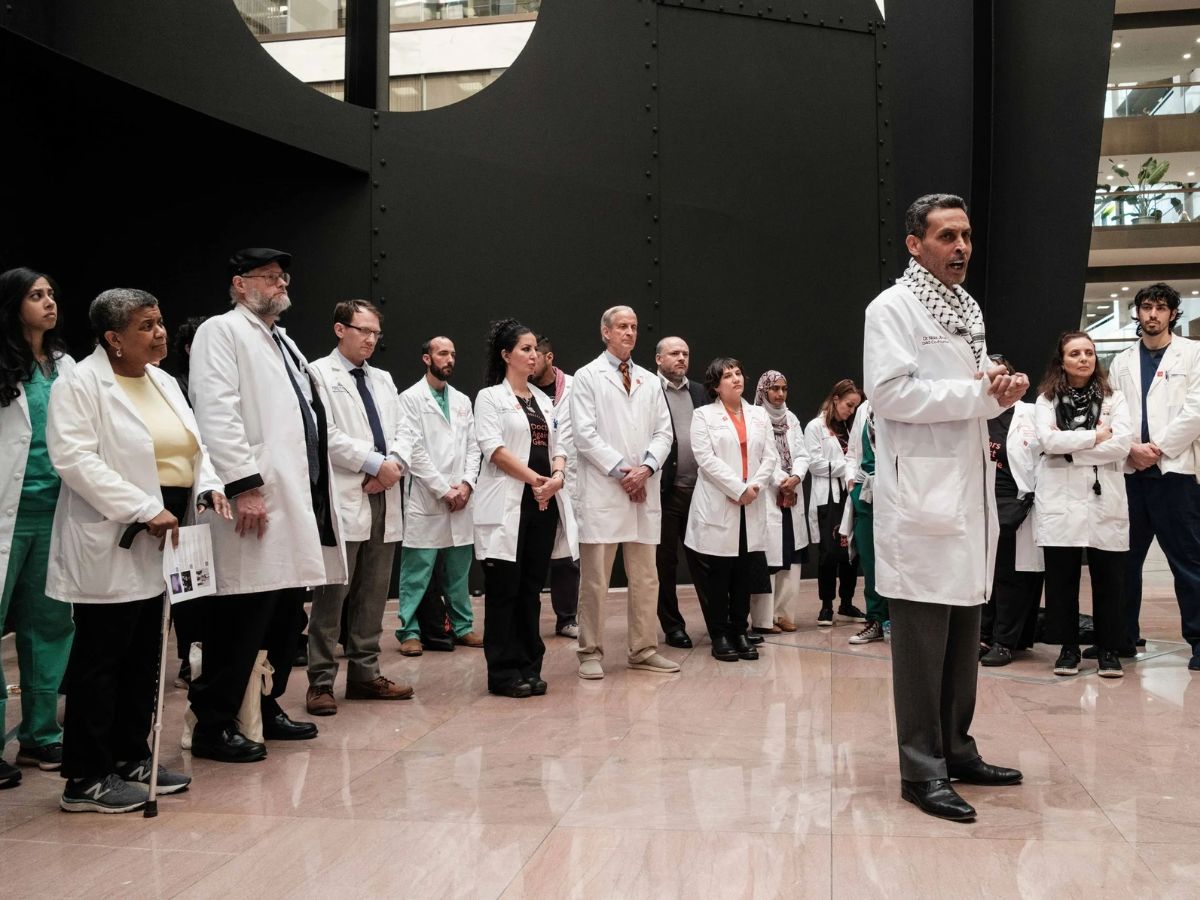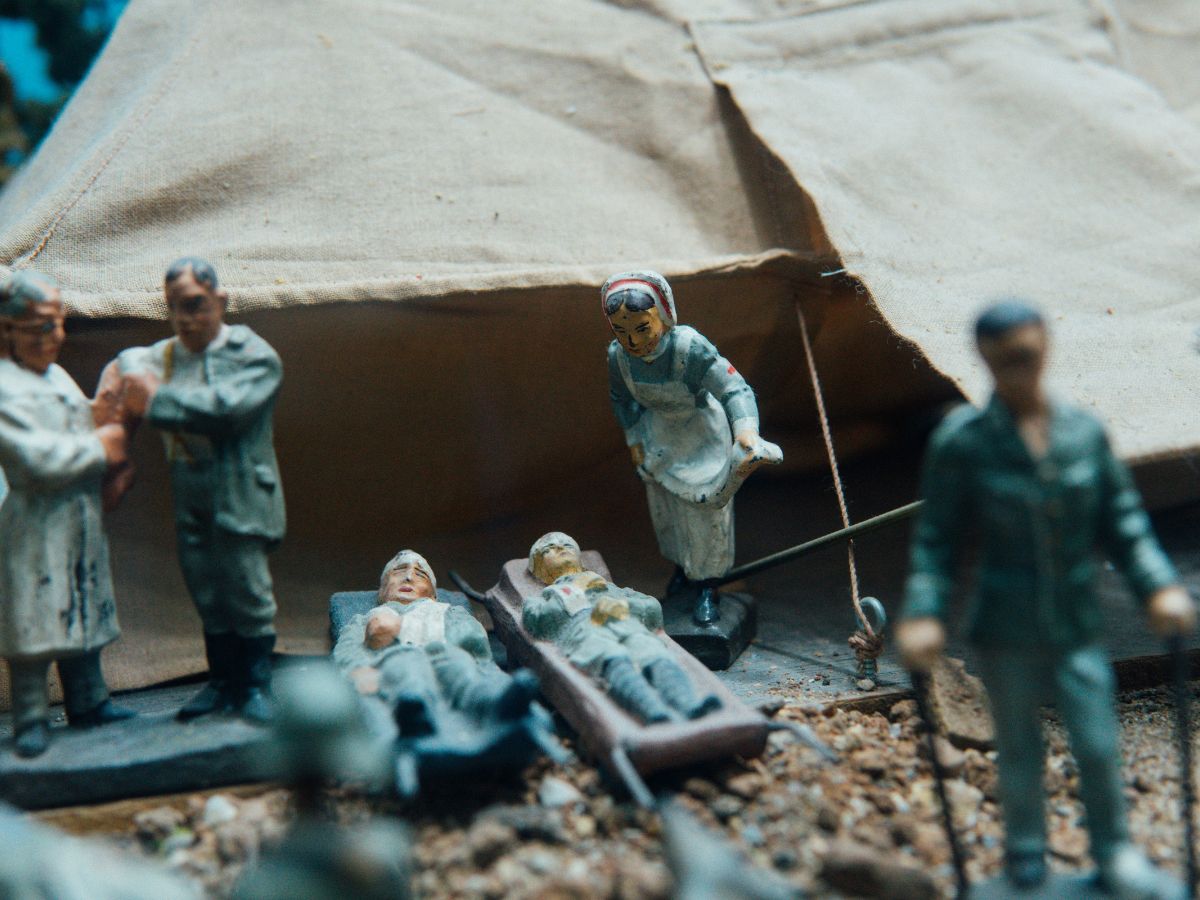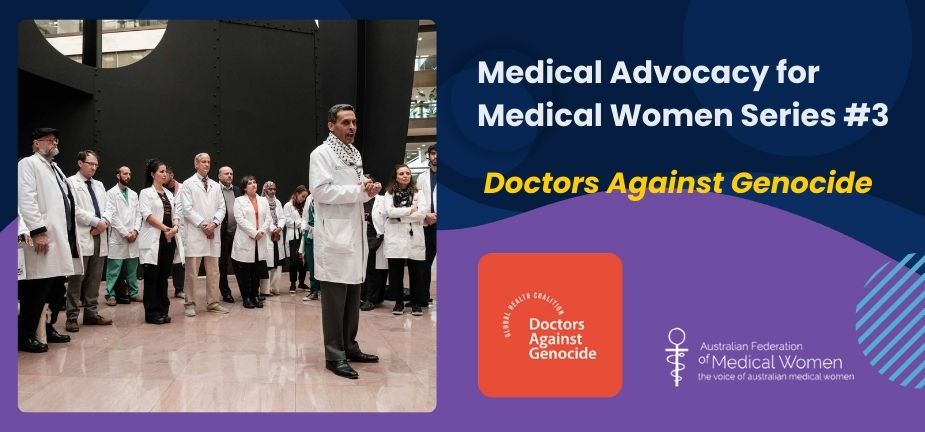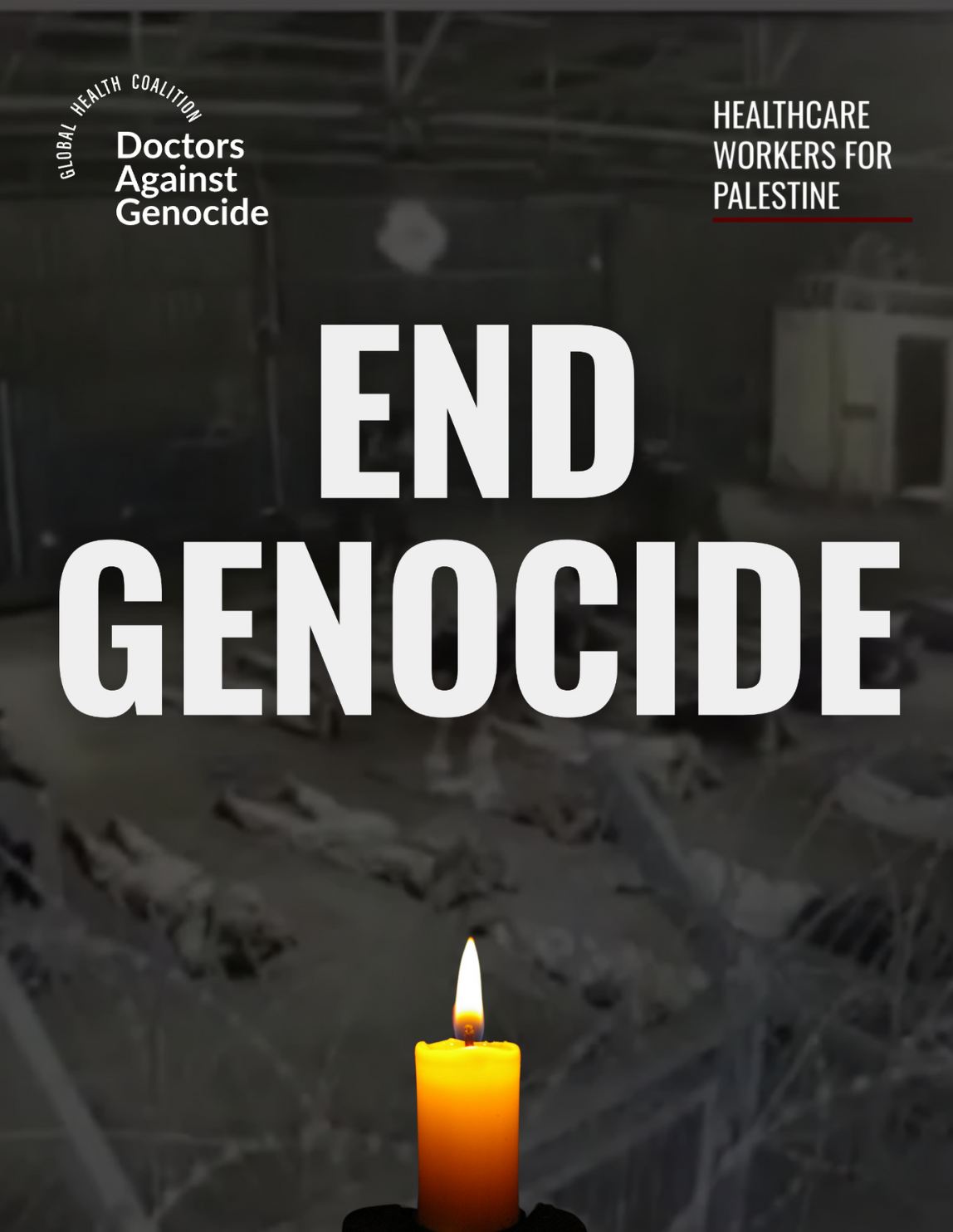This fortnightly series spotlights organisations where doctors are driving social change beyond clinical practice, tackling issues like health inequity, climate resilience, refugee health, and mental health reform. These profiles highlight how medical professionals are using their skills, credibility, and compassion to advocate for systemic change. Each instalment offers tangible ways to get involved – through action, education, or amplification – reminding us that advocacy isn’t just for “other” doctors. It’s for all of us.
In this third instalment, we take a look at Doctors Against Genocide.
Doctors Against Genocide: When Medicine Meets Moral Imperative

Origins and Mission
Founded in 2023 by American physicians, Doctors Against Genocide (DAG) is a global network of doctors who believe that medical ethics demand action in the face of atrocity. Recognising the unique position of healthcare workers as both witnesses and responders to human suffering, DAG’s mission is clear: to confront and prevent genocide, war crimes, and crimes against humanity through medical advocacy and action.
The organisation seeks to bridge the gap between the medical oath to “do no harm” and the helplessness many clinicians feel as a result of their inability to prevent harm from being perpetrated. With a strong current focus on Palestine, its broader mission is to embed a culture of medical activism wherever systemic injustice, including violence, is allowed to unfold.
The Current Crisis in Palestine: Healthcare Under Attack
As of May 2025, the humanitarian situation in Gaza has reached disastrous proportions after 19 months of sustained conflict. The systematic destruction of healthcare infrastructure, combined with critical food shortages and an ongoing blockade of humanitarian aid, has created conditions that international organisations describe as nothing short of catastrophic:
- Over 1,400 healthcare workers have been killed since October 2023, including doctors, nurses, paramedics, and surgeons; many continue to operate under nearly impossible conditions
- All public hospitals in northern Gaza are now out of service; the last remaining facility, the Indonesian Hospital, ceased operations in mid-May 2025 due to bombardment and siege conditions
- No humanitarian aid has reached Gaza since 2 March, 2025, leaving its residents in a state of escalating desperation
- The entire population of 2.1 million people is facing acute food insecurity, with one in five facing starvation, including nearly 71,000 children under five
These conditions exemplify what DAG describes as “medicide”: the systematic and deliberate destruction of healthcare systems to prevent access to care, used as a tool of oppression and ethnic cleansing.
Core Campaigns and Initiatives
1. Not Another Child, Not Another Hospital
This campaign demands the protection of medical facilities and personnel in conflict zones, as mandated by the Geneva Conventions. It calls for ceasefires, arms embargoes, and the establishment of healthcare education programs for communities affected by war crimes.
2. Nabqa Huna (“We Shall Remain”)
This initiative supports the resilience of the people in Gaza by working to restore essential services in education, healthcare, and food security. It includes:
- Rebuilding educational opportunities for children, including teacher support and learning materials
- Delivering critical medical supplies and maintaining basic healthcare access
- Providing food assistance, particularly to children and families
3. Bread Not Bombs, Let the Children Eat
Launched in response to a May 2025 statement from the UN Office for the Coordination of Humanitarian Affairs – “The humanitarian response in Gaza is collapsing. Children are dying of hunger and dehydration” – this campaign addresses what DAG describes as “mass starvation by design” and centres on the framing of famine as a deliberate policy, not an inevitable consequence.

Global Reach: The Medical Alliance Against Genocide
DAG operates as a decentralized network, encouraging the formation of local chapters to tailor advocacy efforts to regional contexts. However, it has expanded its efforts globally to amplify its message, by forming the Medical Alliance Against Genocide (MAAG), a coalition of healthcare organisations dedicated to preventing war crimes, “medicide”, and upholding human rights. MAAG works to:
- Expose atrocities and demand accountability
- Prevent the deliberate destruction of healthcare infrastructure
- Amplify frontline voices and document the truth
- Mobilise medical and humanitarian support
- Advocate for equitable healthcare and universal human dignity
By joining forces across borders, these medical professionals aim to leverage their collective influence to confront systematic violence against healthcare.
Educational Resources and Advocacy
DAG places strong emphasis on education, holding frequent webinars and providing reports and advocacy tools covering:
- The realities of genocide and war crimes
- The role of healthcare workers in prevention and response
- The psychological impact on children in conflict zones
- The concept of “medicide” and its catastrophic effects on population health
The Australian Connection: ANZ Doctors For Palestine
Although DAG currently has no formal chapter in Australia, a kindred initiative exists in the Australia & Aotearoa New Zealand Doctors for Palestine (ANZDFP).
ANZDFP advocates for policies that support Palestinian human rights, justice, and equality. The organisation focuses on public education and grassroots mobilisation, particularly around issues often overlooked or underreported in mainstream Australian media.
Through statements, events, and digital advocacy, ANZDFP seeks to inform the Australian public about the humanitarian crisis in Palestine and its broader global implications. Most recently, it released a media statement highlighting the negative mental health impact of censorship on students in Australia’s educational institutions.
What Can I Do?
There are several meaningful ways to engage with this cause, regardless of your career stage or availability:
For International Engagement with DAG:
- Join DAG: Become a member to stay informed and access resources
- Start a Local Chapter: Consider establishing an Australian chapter
- Participate in Campaigns: Engage with initiatives to raise awareness and demand action
- Educate and Advocate: Utilise DAG’s educational materials to inform peers and the public
- Amplify their message: Follow and engage with DAG’s channels on LinkedIn, Facebook, Instagram and/or Twitter/X.
For Local Engagement with ANZDFP:
- Become a Member: Join the ANZ-based advocacy effort
- Access Their Action Toolkit: A step-by-step guide to support efforts, from telehealth to donations
- Divest Your Superfund: Rethink your investment choices for ethical alignment
- Amplify their message: Follow and engage with ANZDFP’s channels on Facebook and Instagram.
Your Reflection
As a doctor committed to healing, how do you respond when medical neutrality is violated and healthcare itself becomes a target? When healthcare workers, women and children are systematically targeted?
How can you, as a medical woman, leverage your unique skills and ethical commitment to uphold your oath to “do no harm” in contexts where professional silence indicates complicity?
Note:
The writer acknowledges the challenge of varying figures and potential underreporting in this genocide. Additionally, the ongoing conflict and access restrictions make obtaining real-time data difficult, which could impact the accuracy and completeness of information provided in this article. References were accessed as close to the publish date as possible.
References:
Al-Mughrabi, N. (2025, May 15). Israeli onslaught kills scores in Gaza as Trump visits Gulf. Reuters. Retrieved May 20, 2025, from https://www.reuters.com/world/middle-east/israeli-military-strikes-kill-scores-gaza-medics-say-2025-05-15/
Fox, K. (2025, May 18). Israel begins extensive Gaza ground operation after intense air strikes kill more than 100 overnight. CNN. Retrieved May 20, 2025, from https://edition.cnn.com/2025/05/18/middleeast/israel-gaza-peace-talks-millitary-operation-intl
Humanitarian Situation Update #288 | Gaza Strip | United Nations Office for the Coordination of Humanitarian Affairs – Occupied Palestinian Territory. (2025, May 14). OCHA oPt. Retrieved May 20, 2025, from https://www.ochaopt.org/content/humanitarian-situation-update-288-gaza-strip
Reported Impact Snapshot | Gaza Strip (14 May 2025) | United Nations Office for the Coordination of Humanitarian Affairs – Occupied Palestinian Territory. (2025, May 14). OCHA oPt. Retrieved May 20, 2025, from https://www.ochaopt.org/content/reported-impact-snapshot-gaza-strip-14-may-2025
Photo Credit:
1. Photo from the DAG website
2. Photo by Mert Kahveci on Unsplash
Others in the Series
Dr Madhura Naidu is an Intensive Care Registrar and trainee with the College of Intensive Care Medicine with over a decade of multidisciplinary clinical experience spanning ICU, anaesthesia, surgery and palliative care. She brings a comprehensive clinical skillset and a systems-based perspective to critical care, grounded in evidence-based, compassionate and patient-centred practice.
She is particularly passionate about the strategic integration of AI and digital health in medicine as tools to streamline workflows, empower clinicians, and improve patient outcomes in real-world settings.
Beyond the bedside, Madhura is an intersectional feminist and long-time advocate for gender equity and clinician wellbeing. She currently serves as Vice-President of the Australian Federation of Medical Women (AFMW) — the only national organisation exclusively representing the women and non-binary medical workforce — following a three-year tenure as President of the Victorian Medical Women’s Society.
A lifelong learner, Madhura is driven by adaptability, innovation, and building efficient, future-focused solutions across clinical, organisational and digital health settings.


